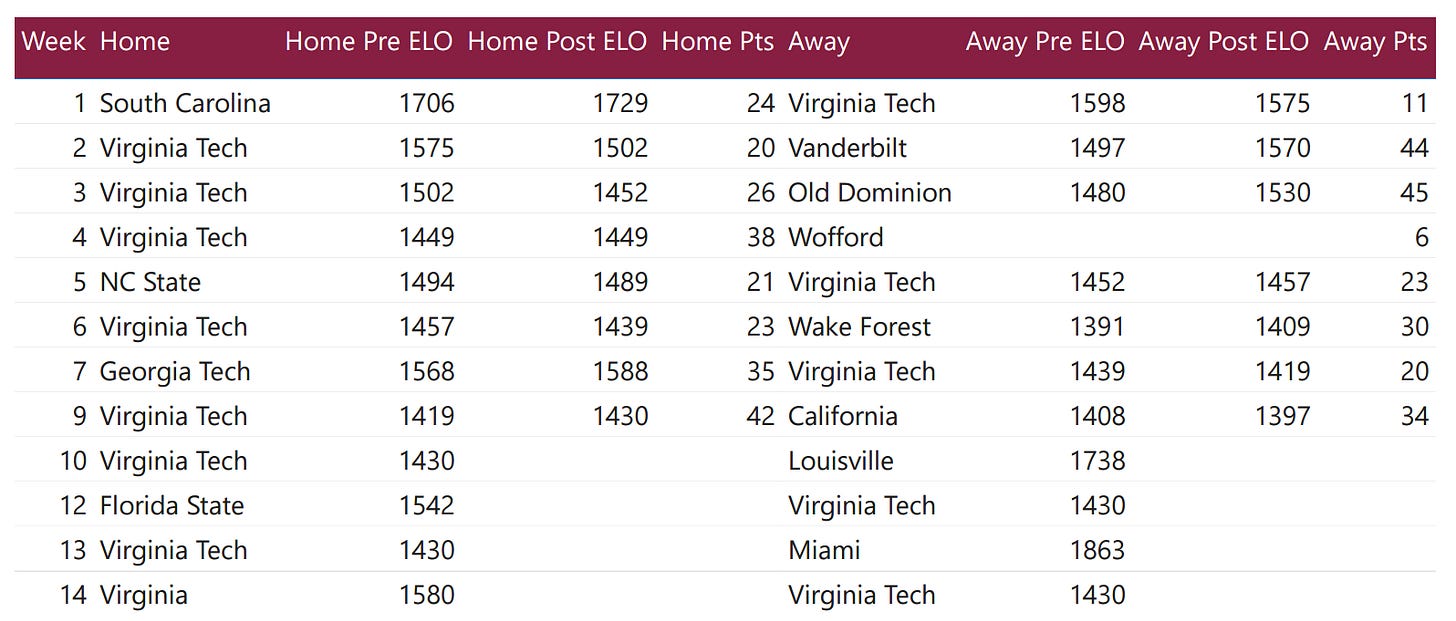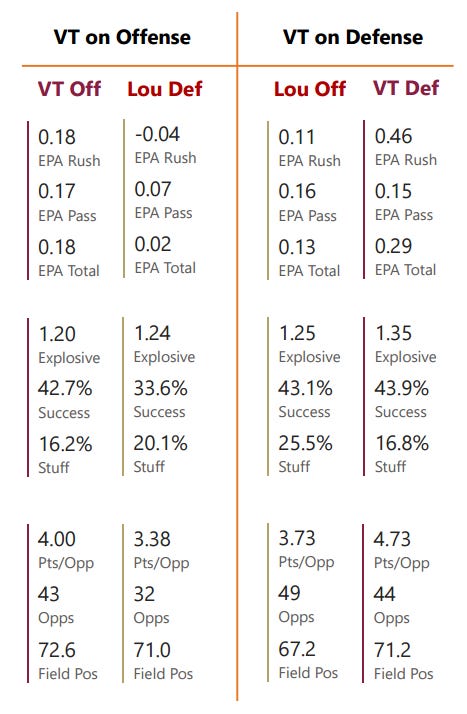All to Play For
Philip Montgomery and the Hokies enter November in a better position than many imagined possible
It seems like just yesterday that Shane Beamer was going to “reset the clock” by becoming Virginia Tech’s next coach.
This week James Franklin was the name du jour.
Perhaps next week the Louisiana governor will take a break from micromanaging the LSU athletic department in order to advise Virginia Tech’s search committee on who should wear the big whistle next year in Blacksburg.
Brian Kelly, anyone?
At this point, all the noise is pure comedy.
Let’s focus on the here and now.
After the Hokies beat Wofford, I wrote the following:
No one has more on the line than Philip Montgomery. A 6-2 conference record (obviously very unlikely) would make him Virginia Tech’s coach in 2026. Even five wins might be good enough to get that interim tag removed.
Four wins would get him a P4 coordinator job or a shot at a G5 head coaching opportunity.
Two to three wins would give him a shot at a G5 coordinator gig.
Anything less, and he’s probably done coaching college football.
The Hokies are 2-2 in the ACC, and 3-2 overall under Montgomery. He will be coaching college football next year if that is what he wants to do.
However, with dominoes not following (Matt Rhule, Curt Cignetti, and Rhett Lashlee have all recently signed contract extensions at their current schools), the list of coaches under consideration for open head coaching positions has shrunken.
Depending on who you ask, the Virginia Tech job is somewhere between #4 and #6 in terms of desirability among programs with openings, with the potential to fall further if the Florida St. and/or Auburn jobs come open.
All of this begs the question - is the sixth best available coach an upgrade over the current (interim) coach?
In his six weeks at the helm, Montgomery has:
deftly and discreetly separated the players who did not belong in Blacksburg from those that do
won two one-score games, twice as many as Brent Pry managed in three-plus years
earned the appreciation of a fan base that was staring down a 1-11 season after Pry’s dismissal
And let us not forget that Monty won ten games in 2016 at Tulsa, and he took the Golden Hurricane to four bowl games during his eight-year tenure as head coach.
That experience should be good preparation for the slate of games Tech will play in November. The most favorable matchup, on paper anyway, is at Florida St., so if Montgomery wants to be the full-time head coach in Blacksburg, he’s going to have to earn it.
A win over a top-20 Louisville team in Lane Stadium would definitely help the cause, but it will not be easy.
In terms of both ELO (-308 points) and the spread (+11.5), Tech is a major home underdog.
While last week’s win over Cal was fun, it was not unexpected (Tech was favored according to ELO and the spread). Beating Louisville would be an attention getter.
When Virginia Tech has the ball
Louisville (6-1, 3-1) features an elite defense that nonetheless allows opposing teams to score a surprising number of points.
The players in Louisville’s regular defensive rotation who have the lowest PFF grades on the season are on par with Kemari Copeland and Cody Huisman, Virginia Tech’s two highest graded defenders.
The Cardinals are especially stacked at Edge. If allowed to pin their ears back, those guys will embarrass Tech’s tackles.
Expect Montgomery to frequently leave them unblocked and attempt to option them into oblivion. If Monty and Drones can keep those Edges guessing, it will give Johnny Garrett and Aidan Lynch a fighting chance.
Louisville is very stingy against the run. However, one could credibly argue that the Hokies feature the best rushing attack that Louisville will face all season.
If Louisville commits an extra hat to the box, Tech will need its receivers to make plays on the outside.
Donovan Greene has been very quiet in recent weeks. He is due to break out of this recent funk and play a good game.
Benji Gosnell is another guy who has been rather quiet. Keeping a defense off balance requires the offense to break tendencies. For that reason, Gosnell is another player worth keeping an eye on.
Louisville knows the Hokies want to run the ball. The extent to which Tech will be successful in that endeavor depends on how far variety, misdirection, and play action will go toward equaling the talent/experience disparities that, in terms of 1-on-1 matchups, favor Louisville.
When Virginia Tech is on defense
The good news is that Louisville’s offense is not particularly dynamic. In fact, Virginia Tech’s offense has a higher EPA/play in both rushing and passing.
One stat that really stands out is stuff rate allowed, which is an astonishingly high 25.5% for Louisville.
Three of Louisville’s starting offensive linemen grade out below the baseline of 60, according to PFF. Whichever Virginia Tech tackle lines up opposite Louisville Guard Jordan Church is likely to have a big day. Church struggles mightily in pass blocking (41.7) and is below average in run blocking (57.8).
In fact, Louisville’s offense reminds me of South Carolina’s, except quarterback Miller Moss is not mobile and the Cardinal running backs are better.
Tech’s defensive line alone should keep the Hokies in this game.
The Hokies are likely to blitz a fair amount on passing downs, as the Louisville running backs, Isaac Brown (21.8) and Keyjuan Brown (18.1), are absolutely atrocious in pass blocking. The path of least resistance is running right through these backs.
Chris Bell, Louisville’s highest graded player on offense, is an excellent wide receiver. He is also a willing and able run blocker. However, none of the other pass catchers really jump off the page. That opens the possibility of the Hokies employing bracket coverage on Bell.
Overall, the Louisville offense is a pretty good matchup for Tech’s defense.
One key stat that could decide the game is average starting field position. Here, the Cardinals have a 5.4 yard advantage over the Hokies.
Final thoughts
Louisville’s ELO aligns with a 9-3 regular season, which suggests the Cardinals will go 3-2 in November.
That would mean Louisville is fixing to get upset because they should be favored in every game left on their schedule. The team’s toughest tests in its last four games are at home against Clemson and on the road at SMU.
In that context, a loss in Blacksburg looks as likely as anywhere else.
Virginia Tech is rightly the underdog, but this matchup is much closer than it has been portrayed all week.
Louisville’s gaudy rushing numbers do not align with their mediocre-at-best offensive line and average quarterback play.
Likewise, the defense’s impressive PFF numbers mask a surprising number of points allowed.
In four ACC games, Virginia Tech has allowed an average 30 points per game. Louisville has allowed an average of 26.
In regulation Louisville has allowed between 21 and 27 points to every ACC opponent.
Louisville’s 3-1 conference record is entirely driven by turnovers. In the three wins, the Cardinals forced a combined 12 turnovers, or 4 per game.
In the lone defeat, in overtime to UVA, they generated zero turnovers.
For Virginia Tech, there is no need to force anything on offense. Three runs and a punt is fine.
Louisville is squeaking out wins on the basis of their attacking defense forcing opposing offenses to make grievous mistakes.
The Hokies can score 24 points and win this game if they stay patient and avoid turning the ball over.
But if they give the ball away twice in the first half? Forget about it.




